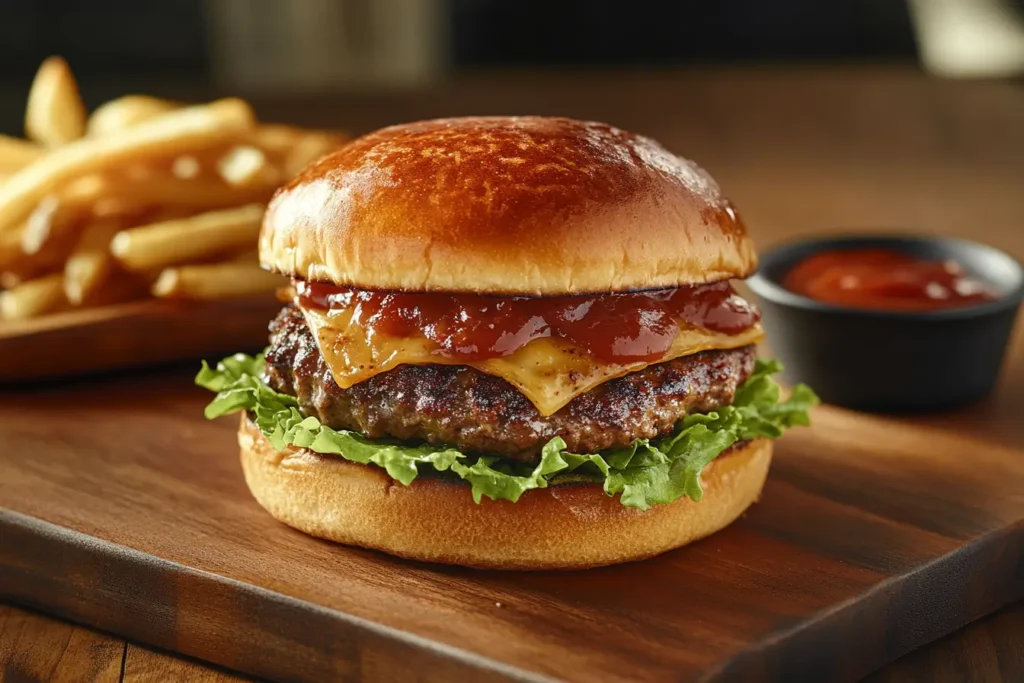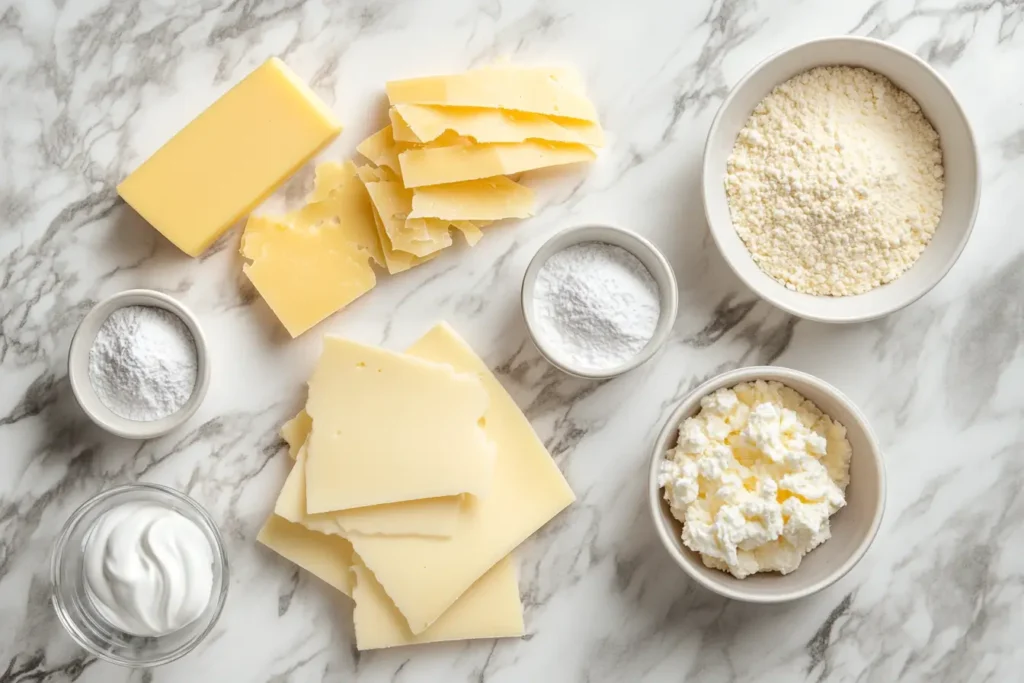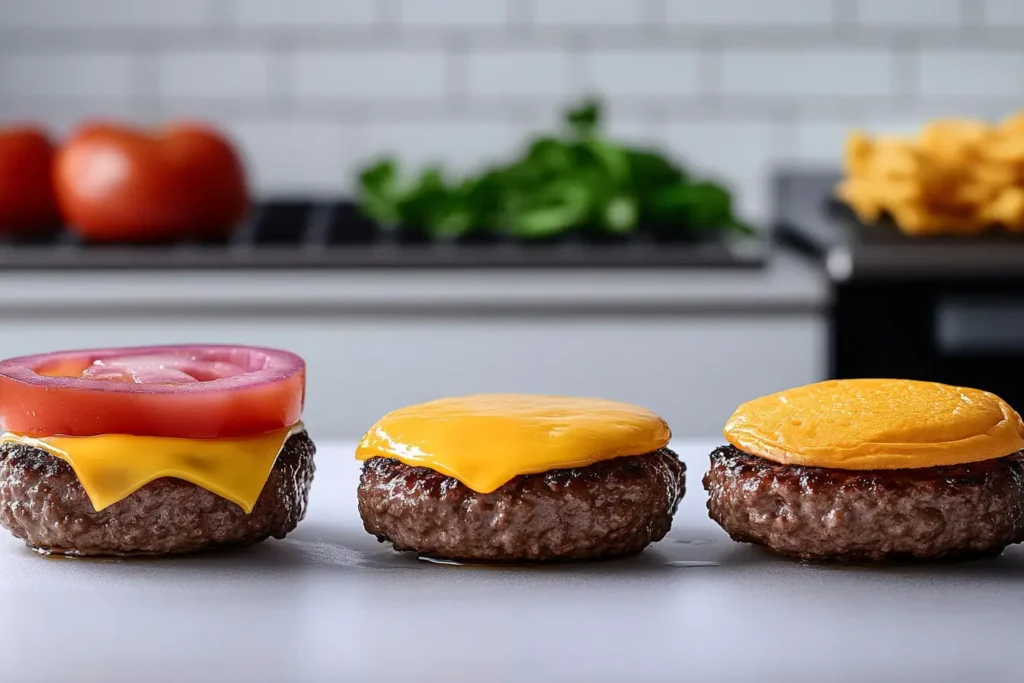Cheese burgers are an all-time favorite, and burger cheese is a huge part of what makes them so irresistible. But have you ever wondered what gives burger cheese its signature melt, creamy texture, and rich flavor? In this article, we’ll uncover the secrets behind burger cheese, explore the different types used, and explain how it’s made. Let’s dive into the delicious world of burger cheese!
What Is Burger Cheese Made Of

Table of Contents
Introduction to Burger melt
What Is Burger Cheese Made Of?
Burger cheese, most commonly known as processed cheese or American cheese, is designed specifically for burgers. Its creamy, gooey texture and ability to melt seamlessly over a sizzling patty make it a classic choice for cheeseburgers. Unlike natural cheeses, burger cheese is made with a unique blend of natural cheese, emulsifiers, and other ingredients that give it its signature properties.
This cheese isn’t just about taste—it’s about enhancing the burger experience. The way it oozes over the patty, hugging every corner, creates that picture-perfect cheeseburger you’d expect at your favorite diner.
The Popularity of Cheese in Burgers
The combination of beef and cheese has been a staple since the early 20th century. Adding a slice of cheese not only boosts flavor but also adds richness and visual appeal. Over the years, burger cheese has become a must-have ingredient in fast-food chains and home kitchens alike.
Interestingly, the question what is burger cheese made of has sparked curiosity among food lovers. The secret lies in its careful formulation, which ensures a consistent melt and flavor profile. From classic American cheese to gourmet options like Swiss and cheddar, the love for cheese on burgers knows no bounds.
Types of Cheese Commonly Used in Burgers
American Cheese: The Classic Choice
When people think about cheeseburgers, American cheese often comes to mind. This iconic cheese is specially designed for burgers, offering a creamy texture and the perfect melt. Thanks to its mild flavor, it complements the savory beef without overpowering it. Fast-food chains and diners favor American cheese because it’s consistent and reliable—every slice melts just the same.
If you’re making a comforting dish like slow cooker cube steak, adding a slice of melted American cheese on top can bring a cheeseburger-inspired twist to the meal.
Cheddar, Swiss, and Other Meltable Cheeses
For those seeking a bold flavor, cheddar is a popular choice. Sharp cheddar adds a tangy punch, while mild cheddar offers a creamier experience. Swiss cheese, with its nutty flavor and signature holes, is another classic option for gourmet-style burgers.
Other varieties like pepper jack, mozzarella, or even brie can turn an ordinary burger into a culinary masterpiece. These cheeses melt well, ensuring a gooey layer that blends seamlessly with the juicy patty.
Specialty and Regional Cheeses in Burgers
For adventurous eaters, specialty cheeses such as blue cheese or smoked gouda offer unique flavors. Blue cheese crumbles provide a tangy contrast to the rich beef, while gouda’s smoky notes elevate the burger to gourmet status. Regional favorites, like pimento cheese in the Southern U.S., bring a local flair to the burger experience.
Explore more cheese ideas for burgers to find the perfect match for your next creation.
Ingredients of Burger Cheese

What Makes Processed Cheese Ideal for Burgers?
Processed cheese, like American cheese, is a blend of natural cheese, emulsifiers, and additional ingredients that enhance its melting properties. Emulsifiers are key—they keep the cheese smooth and prevent it from separating into oils and solids when heated. This consistency is why processed cheese is the top choice for burgers.
Additionally, processed cheese contains preservatives that extend its shelf life, making it a convenient option for restaurants and home cooks alike. Its slightly salty, creamy flavor pairs perfectly with classic burger toppings like pickles and ketchup.
Natural vs. Processed Cheese: Key Differences
Natural cheese is made from milk, salt, and enzymes, offering bold and varied flavors. However, it doesn’t always melt as evenly as processed cheese. For example, cheddar might separate under high heat, while processed cheese remains velvety and cohesive.
If you’re experimenting with dishes like slow cooker cube steak, processed cheese ensures a silky, uniform finish. On the other hand, natural cheese can add depth and complexity to a burger’s flavor profile.
How Is Burger Cheese Made?
Manufacturing Process of Processed Cheese
Ever wondered what is burger cheese made of and how it’s crafted? The process begins with natural cheese, such as cheddar or colby, which is shredded and blended with emulsifying salts. These salts help create a smooth, consistent texture, allowing the cheese to melt evenly without separating.
The mixture is then heated and mixed thoroughly, resulting in a creamy, pourable base. Additional ingredients, like milk, whey, and preservatives, are often added to improve shelf life and texture. Once the cheese achieves its desired consistency, it’s cooled and shaped into slices or blocks, perfect for burgers.
Processed cheese’s unique formulation ensures it performs well under heat, making it the ultimate choice for that iconic cheese pull on a burger.
Role of Emulsifiers and Preservatives in Burger Cheese
Emulsifiers are the secret sauce of processed cheese. They bind water and fat molecules together, preventing the cheese from splitting when melted. Without emulsifiers, the cheese would become greasy or lumpy instead of smooth and stretchy.
Preservatives also play a crucial role in burger cheese. They keep the product fresh and prevent spoilage, which is essential for mass production and storage. This combination of science and flavor is why processed cheese remains a staple for burgers worldwide.
For more cheesy insights, explore our guide to burger cheese.

Nutritional Profile of Burger Cheese
Calories, Fat, and Protein Content
Burger cheese is as indulgent as it is delicious. A typical slice of processed cheese contains around 60-70 calories, with 4-5 grams of fat and about 3 grams of protein. While it’s not the healthiest cheese on the block, its creamy texture and meltability make it an irresistible addition to burgers.
If you’re balancing indulgence and nutrition, pair burger cheese with lean proteins or veggie-packed dishes like slow cooker cube steak to enjoy its flavor in moderation.
How Does Burger Cheese Compare to Other Cheeses?
Compared to natural cheeses, processed burger cheese is often lower in fat and calories but may contain more sodium due to preservatives. While cheddar or Swiss cheese boasts more complex flavors and nutrients, processed cheese excels in versatility and convenience.
So, what is burger cheese made of that makes it stand out? Its carefully crafted blend of natural cheese, milk solids, and emulsifiers ensures a consistently creamy experience, perfect for melting over a hot burger patty.
Looking for more ways to enjoy burger cheese? Check out our collection of comfort food recipes.
Flavor Profiles and Textures of Burger Cheese
Why Does Burger Cheese Melt So Well?
One of the most compelling aspects of burger cheese is its superior melting ability. But what is burger cheese made of that gives it this quality? The answer lies in its formulation. Processed cheese is designed with emulsifiers and stabilizers, which create a consistent structure. When heated, these components prevent separation, ensuring a smooth and even melt.
This characteristic makes burger cheese the top choice for cheeseburgers, as it effortlessly drapes over the patty, melding with other toppings. Whether you’re grilling a burger or adding cheese to slow cooker cube steak, its meltability ensures a luscious finish.
Flavor Profiles of Different Burger Cheeses
Burger cheese is known for its mild, creamy flavor, which enhances the savory taste of beef without overshadowing it. American cheese is the most common, offering a salty and slightly tangy note. Cheddar brings a sharper flavor, while Swiss adds a nutty touch.
For those seeking variety, blue cheese or pepper jack can bring boldness and spice to your burger. The versatility of burger cheese allows it to cater to every palate, making it a universal favorite.
Pairings with Burger Cheese
Classic Burger Toppings with Cheese
Burger cheese pairs beautifully with classic toppings like lettuce, tomato, and onion. The creamy, salty nature of the cheese balances the freshness of vegetables, while condiments like ketchup and mustard add tangy and sweet flavors.
Pickles, with their crunch and acidity, cut through the richness of the cheese, creating a harmonious bite. For the perfect cheeseburger, stick to these timeless combinations that highlight the best of burger cheese.
Creative Pairings: Bacon, Avocado, and More
If you’re feeling adventurous, try pairing burger cheese with non-traditional ingredients. Crispy bacon and creamy avocado are standout choices, adding layers of flavor and texture. Caramelized onions and sautéed mushrooms can bring a gourmet touch to your cheeseburger.
You can also get creative with sauces. Chipotle mayo, BBQ sauce, or even pesto can elevate a cheeseburger featuring burger cheese. And for a comforting twist, use melted Processed cheese in recipes like slow cooker cube steak or mac and cheese.
If you’re inspired to explore more burger combinations, browse our unique burger recipes.
FAQs Section
What Cheese Is Best for Burgers?
Many ask, what is burger cheese made of and why it’s often preferred for burgers. Processed cheese, like American cheese, is the best choice for its consistent melting ability and creamy texture. However, cheddar, Swiss, and pepper jack are also excellent options, each adding its unique flavor to a burger.
Can You Use Non-Dairy Cheese on Burgers?
Absolutely! Non-dairy cheeses made from almonds, cashews, or soy are great alternatives. These options are often fortified with emulsifiers to mimic the meltability of traditional Processed cheese. Whether you’re vegan or lactose-intolerant, non-dairy cheese can deliver a satisfying burger experience.
Why Does Cheese Enhance Burgers?
The creamy, salty nature of Processed cheese complements the savory flavors of beef, creating a rich, indulgent bite. Cheese also adds a visual appeal, melting into every corner of the patty for that signature cheeseburger look.
Is Burger Cheese Healthy?
While Processed cheese is calorie-dense and contains sodium, it’s fine in moderation. If you’re looking for a healthier alternative, opt for low-fat or natural cheeses. Pairing it with lean proteins or veggie-packed recipes like slow cooker cube steak can balance the meal.
Conclusion and Final Thoughts
Burger cheese is more than just a topping—it’s a key ingredient that elevates burgers to an entirely new level. By now, we’ve answered the question, what is burger cheese made of? From its base of natural cheese to the emulsifiers and stabilizers that ensure perfect melting, it’s clear why Processed cheese holds its place as a favorite.
Whether you prefer classic American cheese or experiment with cheddar, Swiss, or even non-dairy alternatives, there’s a burger cheese for every palate. Its versatility extends beyond burgers, enhancing dishes like slow cooker cube steak and casseroles with its creamy texture and flavor.
Next time you bite into a cheeseburger, take a moment to appreciate the balance of flavors that Processed cheese brings. And if you’re feeling inspired, check out more cheesy recipes to enjoy its magic in new ways.
